Principality of Hutt River
The Principality of Hutt River, often referred to by its former name, the Hutt River Province, was a micronation in Australia. The principality claimed to be an independent sovereign state, founded on 21 April 1970. It was dissolved on 3 August 2020.
Principality of Hutt River | |
|---|---|
 Flag
 Seal
| |
Anthem: "It's a Hard Land" by Keith Kerwin | |
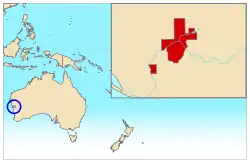 | |
| Location | 28°4′28″S 114°28′14.5″E |
| Capital | Nain |
| Official languages | English (official language) French, Esperanto (per constitution)[1] |
| Ethnic groups | Anglo-Celtic Australians, Australian Aborigines (Nunda Tribe) |
| Demonym(s) | Hutt Riverian |
| Organizational structure | Principality |
| Prince Leonard I | |
| Prince Graeme I | |
| Establishment | |
• Declared independence | 21 April 1970[2] |
• Dissolved | 3 August 2020 |
| Area claimed | |
• Total | 75 km2 (29 sq mi) |
| Population | |
• Estimate | 26 (2019)[3] |
| Purported currency | Hutt River Dollar, tied 1:1 with the Australian Dollar |
| Time zone | UTC+08:00 |
The principality was located 517 km (354 mi) north of Perth, near the town of Northampton in the state of Western Australia. It had an area of 75 square kilometres (29 sq mi), making it larger than several independent countries. It was not recognised as a country by the Australian Government nor any other national government, and the High Court of Australia and Supreme Court of Western Australia rejected submissions arguing that it was not subject to Australian laws.[4]
The principality was a regional tourist attraction until it announced it was closed to tourists after 31 January 2020.[5][6] It issued its own currency, stamps and passports (which are not recognised by the Australian government or any other government).[7] The micronation was founded on 21 April 1970 when Leonard Casley declared his farm to be an independent country, the Hutt River Province. He attempted to secede from Australia over a dispute concerning wheat production quotas. A few years later, Casley began styling himself as "Prince Leonard" and granting family members royal titles, although he did not include the word "principality" in the official name until 2006.
In February 2017, at the age of 91 and after ruling for 45 years, Casley abdicated the throne in favour of his youngest son,[8] Prince Graeme.[9][10] Prince Leonard died on 13 February 2019.[11][12]
In December 2019 the principality announced that it would close its borders and cease its external government services as of 31 January 2020, until further notice.[13] On 3 August 2020 the principality formally dissolved.[14]
History
.jpg.webp)
Leonard Casley (28 August 1925 – 13 February 2019)[15] declared the principality an independent province in 1970 in response to a dispute with the government of Western Australia over what the Casley family considered draconian wheat production quotas.[16] The Casley farm had around 4,000 hectares (9,900 acres) of wheat ready to harvest when the quotas were issued, which allowed Casley to sell only 1,647 bushels or approximately 40 hectares (99 acres).[17] Initially, the five families who owned farms at Hutt River banded together to fight the quota, and Casley lodged a protest with the Governor of Western Australia, Sir Douglas Kendrew. The Governor did not assist.[16]
Casley lodged a court claim in tort against the Governor for A$52 million in the hope the claim would force a revision of the quota. Casley also claimed he made a successful court claim using the law of unjust enrichment to successfully seize government land surrounding his farm which he hoped would increase his wheat quota.
Two weeks later, Casley claimed the government introduced a bill into Parliament to "resume" his and the other families' lands under compulsory acquisition laws. At this point, Casley claimed that international law allowed them to secede and declare independence from the Commonwealth of Australia. Casley said that he nonetheless remained loyal to Queen Elizabeth II.[7][18][19] From this time on Casley asserted that the Principality had successfully seceded from Australia.
At about this time, Prince Leonard claimed that in correspondence with the Governor-General's office, Casley was on one occasion inadvertently addressed as the "Administrator of the Hutt River Province". Casley claimed that this constitutes legally binding recognition of the principality.[18]
At about this time, Leonard Casley styled himself "His Majesty Prince Leonard I of Hutt". Casley did this because he believed it would enable him to take advantage of the British Treason Act of 1495, which provides that the de facto king of a nation cannot be guilty of treason in relation to any act against the lawful king and that anyone who interfered with that monarch's duties could be charged with treason.[7] No government or legal scholar has ever accepted this legal theory of Prince Leonard's.
Prince Leonard said that he continued to sell his wheat in open defiance of the quota.[20] Casley believed that under Australian law the federal government had two years to respond to Casley's declaration of sovereignty. Casley says the failure to respond gave the province "de facto autonomy" on 21 April 1972, but that the Western Australian government can still dispute the secession.[21]
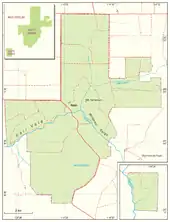
On 15 February 1977, despite Prince Leonard's claims to sovereignty, he was successfully prosecuted for failing to comply with requirements to furnish the Australian Taxation Office (ATO) with required documents.[22]
On 2 December 1977 the principality declared war on Australia. Prince Leonard notified authorities of the cessation of hostilities several days later.[21] It may be more than coincidence that this declaration of war came in just a few months after a court decision where Casley was fined for failing to furnish the ATO with certain documents. The short state of war between the principality and Australia was a scheme whereby the Prince's purpose was to argue that, under the Geneva Treaty Convention of 12 August 1949, a government should show full respect to a nation undefeated from a state of war.[16] Casley then wrote to the Governor-General and asserted that: "Sovereignty is automatic to a country undefeated in a state of war ... and if the state of war is not recognized by the other party, once the notice is given then these conventions apply to their relations." Again, there is no support for this theory.
In 1978, Prince Leonard appealed to the Supreme Court of Western Australia against a conviction for conducting a shop on his property without a permit. His appeal was dismissed, except to alter the penalty.[23] Casley did not suggest his land was not subject to Australian law in this appeal.
In 1970 and 1984, Prince Leonard unsuccessfully defended civil legal actions brought against him by private parties – in the former case an injunction was granted against him in relation to a land deal; in the latter case he was ordered to pay debts owed to a publishing company he had contracted to print copies of a book called The Man, which was about himself and his achievements. Prince Leonard did not suggest in these cases that he was not subject to the jurisdiction of the courts of Australia.[24][25]
In the early 1980s, the principality declared itself to be a kingdom, but soon reverted to its original status of a principality. The principality released a number of stamps and coins.[20][26]
In about 2006, the Prince was again successfully prosecuted by the ATO. He sought special leave to appeal to the High Court of Australia, but his application was dismissed with the comment that his arguments were "fatuous, frivolous and vexatious".[27]
In September 2006, Prince Leonard decided to change the province's name to "Principality of Hutt River".[28]
In January 2017, The Prince announced that, after ruling for 45 years, he would be stepping down as prince, to be succeeded by his youngest son, Graeme. With a number of potential sons and daughters, the successor was nominated by Casley and approved by a crown committee. Some commentary at the time had expected his older son, Ian, to be the successor.[8][29][30]
In June 2017, Prince Leonard was ordered by the Supreme Court of Western Australia to pay $2.7 million unpaid tax, and Arthur Casley was ordered to pay $242,000 unpaid tax.[31]
In December 2019, citing declining revenue from agriculture as well as a drop in tourist numbers, the Principality issued a media release to announce that it would be closing its borders with effect from 31 January 2020. The Principality would no longer accept visitors, would cease to issue entry and exit visas, and would stand down most government services and offices for the duration of the hiatus. The announcement included the following statement: "It is with a heavy heart and after much thought and consultation with my Cabinet and ADC that I have to inform all that the Government of the Principality of Hutt River is about to go on hiatus. Our borders will be closed to all (including tourists) and all government external services will cease at close of business Friday 31 January 2020 until further notice."[32]
On 3 August 2020 the Principality was formally dissolved, amidst financial market impact of the COVID-19 pandemic[33] along with disputes with the Australian Taxation Office demanding the Principality pay millions in unpaid taxes across its 50-year history. The Principality's owned land will be sold off to settle the tax dispute.[14][34]
Status
The Principality had no legal status as a matter of Australian law. In 2007, the High Court of Australia dismissed an application by Casley for leave to appeal against a judgment against him relating to his son Leonard's failure to file tax returns. Leonard argued that he resided in the "Hutt River Province" and that it is not part of Australia and not subject to Australian taxation law. The court dismissed Casley's application and found that his arguments were "fatuous, frivolous, and vexatious."[27]
The Australian government unequivocally stated on its website that it did not recognise the secession of the principality.[35][36] Passports issued by the principality were not recognised by the Australian government.[36] Leonard made unverified claims that they have been accepted on some occasions by some unspecified foreign countries,[37] but there was a documented instance of a man being arrested in Germany for attempting to use a Hutt River Province "diplomatic passport".[38]
Prince Leonard claimed that the ATO sent him a tax demand in 2012 to which he simply responded with a document stating that he was a "foreign national and non-resident of Australia".[20] He also repeatedly claimed that he was classed by the ATO as a "non-resident of Australia for income tax purposes" and did not pay tax.[20][39][40][41][42] In 2017, however, Justice Le Miere of the Supreme Court of Western Australia ordered Leonard to pay more than A$2.7 million in unpaid taxes, and Arthur Casley to pay more than A$242,000 in unpaid taxes. The judge said that their argument of sovereignty "has no legal merit or substance. Anyone can declare themselves a sovereign in their own home but they cannot ignore the laws of Australia or not pay tax."[43][44] An appeal to the Court of Appeal was dismissed.[45]
Despite this, the Principality continued to argue that it was an independent entity within the Australian legal system.[18][21] The principality tried repeatedly to use a document purporting to be a letter from the Commonwealth Department of Territories admitting that the principality was a "legal entity".[38][46] The Australian government noted that Casley "has used the document in various countries in the past and even sent a copy of it to Senator Evans in 1993".[47] The Australian Government also told foreign governments, "We have seen the purported 'Department of Territories Minute' before. The clumsy language, including a Malapropian use of 'a mute point' gives it away for what it is, a poorly attempted forgery."[38]
The Principality claimed that all social security benefits were withdrawn from Hutt River's residents at the time of secession by the Australian government. It further claimed that residents did not receive pensions, medical benefits, educational allowances, child endowments, or benefits normally paid to war veterans. Voting is compulsory by law in Australia, but Casley claimed to have successfully removed the names of Hutt River residents from the Australian electoral roll.[20] Casley admitted that he made annual payments to the Shire of Northampton, the local government authority, although he chose to characterise these payments as "gifts" rather than council rates.[48] The principality said that it levied its own income tax of 0.5 per cent on financial transactions by foreign companies registered in the province and personal accounts.
There were some occasions where organisations stated that the province had some sort of sovereignty:
- The National Museum of Australia contained an exhibition on the theme of "Separation" within Australia which included a Hutt River Province display which stated that Casley "successfully seceded from Australia".[49]
- Judy Lattas, a sociologist at Macquarie University, once stated that "many officials in Western Australia, some quite high up, and even nationally in Australia are happy to play out the myth of Hutt River's sovereignty" by attending Hutt River functions, returning correspondence, and abandoning the claim for tax.[48]
- In 2005, the Shire of Northampton listed the principality as having "high historic and social significance as the site of Australia's only independent principality."[50]
The principality appears on Google Maps, but only as a "tourist attraction".[51] In 2010, Brendon Grylls, Western Australian Minister for Regional Development and Lands, was asked if his state had a "position" on the principality. He replied, "only that Prince Leonard is an enigma."[52]
Treatment by overseas nations
From 1984 to 2010, Australian diplomatic missions in 28 countries exchanged 120 diplomatic cables with Australia concerning activities relating to the Principality.[16]
In 2008, the Council of the European Union issued a memorandum identifying Hutt River passports among known "fantasy passports ... issued by private organisations and individuals" to which a visa should not be affixed.[53]
Hong Kong does not recognise the principality, but its corporate registry did at one point recognise the Principality as a place where a company could be incorporated. The Hong Kong Registry, however, were looking at reviewing their list of accredited places for company incorporation after the issue was raised in an adverse manner by Australian media.[54][55]
In 2008, a 48-year-old French man who claimed to be an ambassador representing the Principality to the United Arab Emirates, his 36-year-old female compatriot and a 28-year-old Pakistani man, were charged by the UAE over issuing travel documents and selling land in the Principality to UAE residents under false pretences.[56] Casley stated the man had no diplomatic standing in the Principality and had only made a single visit to the province.[57]
In April 2016, the Principality received a letter from Queen Elizabeth II which communicated the Queen's good wishes on the anniversary of the founding of the Principality 46 years ago, on 21 April 1970. The letter from Buckingham Palace was signed by Sonia Bonici, Senior Correspondence Officer. It reads in part: "I am to convey Her Majesty's good wishes to you and to all concerned for a most enjoyable and successful celebration on 23rd and 24th of April to mark the forty-sixth anniversary of the Principality of Hutt River." The Queen was replying to a letter from Prince Leonard congratulating her on her 90th birthday.[58]
Statistics
The Principality was situated 517 km (321 mi) north of Perth, along the Hutt River. It was about 75.9 square kilometres (29.3 sq mi; 18,800 acres) in size. Exports included wildflowers, stamps and coins and agricultural produce which is also exported overseas. Tourism was also important to the economy with 40,000 tourists, predominantly from overseas countries, visiting the principality every year.[20][37][52]
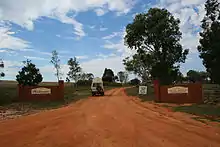
While the Principality had only 23 residents, it claimed a worldwide citizenry of 14,000.[59] The Principality had no standing army, but a number of its citizens were awarded military commissions. Honorary guardsmen attended Casley on formal occasions and, despite being completely landlocked, naval commissions were conferred on supporters of the principality.
After 2 September 2004, Hutt River Province/Principality accepted company registrations. At least one company experienced in the registration of entities in traditional offshore jurisdictions (British Virgin Islands, Cayman Islands etc.) as tax havens were authorised to act as a registered agent for PHR incorporations.[60] On 29 March 2005 the Hutt River Province International Business Company announced it would accept registrations of company trusts which have since been promoted worldwide by registered financial agents.[61] Concerned that Hutt River registrations "may be sold as part of a tax avoidance or evasion arrangement", in April 2012 the Australian Taxation Office warned potential purchasers that the registrations have no legal basis and "could be illegal".[62] Hutt River also allowed car registrations, including issuing licence plates to overseas vehicles.
The principality's capital, Nain, was named after Nain in Galilee. The chapel contains numerous paintings of early Galilee and surrounds.
When the Principality seceded, a bill of rights, a brief document outlining the rights of "Hutt River" citizens, was drafted. It also provided for an administration board to govern the principality until a permanent form of government could be established. When Casley declared himself "Prince", the administration board clause lost effect and the Hutt River Principality became an absolute monarchy, with a legislation committee to draft new legislation.
In 1997, the legislation committee presented a proposal for a constitution to Casley and his cabinet.[63] Although he and the cabinet never officially adopted the proposal, there was a decree stating that any constitution would be in effect while under consideration, except for any clauses that conflict with the bill of rights, so the proposal essentially became a provisional constitution.[60]
Casley family
| His Royal Highness, The Prince of Hutt | |
|---|---|
| Details | |
| Style | His Royal Highness Majesty |
| First monarch | Prince Leonard I of Hutt |
| Last monarch | Prince Graeme I |
| Formation | 21 April 1970 |
| Website | Principality-Hutt-River.com |
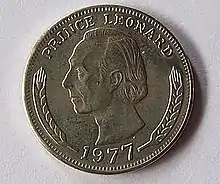
"His Royal Highness Prince Leonard I of Hutt" was the style used by Casley from the creation of the Principality until his death. Casley pursued a number of occupations before purchasing a large wheat farm near the towns of Northampton and Geraldton in the 1960s.
He worked for a shipping company based in Perth, although he left school at 14, and described himself as a mathematician and physicist; he also claimed to have written articles for NASA.[37] He was an adherent of hermeticism, a subject on which he privately published a number of research papers and books.[52] He is the subject of a permanent exhibit at the National Museum of Australia in Canberra.[64]
Casley was married to Shirley (née Butler) until her death on 7 July 2013,[65] when the Principality went into a period of mourning, closing some of its services.[66][67] She was styled as "Her Royal Highness Princess Shirley of Hutt, Dame of the Rose of Sharon", and she played host to dignitaries and diplomatic representatives visiting the Principality each year,[48] as well as receiving television crews and magazine journalists. She was the patroness and chair of the board of directors of the Red Cross of Hutt, a parallel organisation to the International Red Cross.[68]
Princes of Hutt River
Hutt River had two sovereign princes over its 50 year existence, Leonard Casley, Prince Leonard, and Graeme Casley, Prince Graeme, its last. Both Princes abdicated.
| Portrait | Prince | Reign Start | Reign End | Duration |
|---|---|---|---|---|
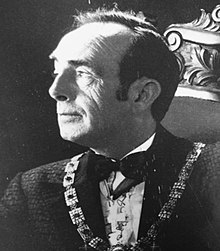 | Leonard I | 21 April 1970 | 11 February 2017 | 46 years, 9 months and 27 days |
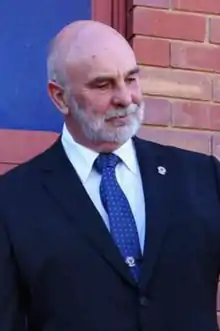 | Graeme I | 11 February 2017 | 3 August 2020 | 3 years, 5 months and 23 days |
Currency
The Principality's currency was the Hutt River Dollar, which was divided into 100 Cents. The Hutt River Dollar was pegged at a one-to-one ratio with the Australian Dollar.[26] All authorised Principality coins were minted by Canada's Lombardo Mint and the New Queensland Mint.
The Principality introduced a set of low denomination banknotes in 1974. These were denominated from 10 Cents to 2 Dollars. Principality coins were issued from 1976 to 2000, then from 2007 to 2018.
First series: 1976–78
Four denominations of coins, 5c, 10c, 20c and 50c, were issued from 1976 to 1978, but the 1978 issue was a proof only issue. There was also a silver $30 coin and a gold $100 coin, struck only in proof.[26]
| Value | Technical parameters | Description | Date of first minting | ||||
|---|---|---|---|---|---|---|---|
| Diameter | Composition | Edge | Obverse | Reverse | |||
| 5c | 16.5 mm | Aluminium | Plain | Leonard Casley | Coat of arms | 1976 | |
| 10c | 19.1 mm | Copper | |||||
| 20c | 22.4 mm | Brass | |||||
| 50c | 24.9 mm | Cupronickel | |||||
| $30 | 38.1 mm | 999‰ silver | Reeded | ||||
| $100 | 25 mm | 24 carat gold | Plain | ||||
| For table standards, see the coin specification table. | |||||||
Silver Jubilee $1 coin
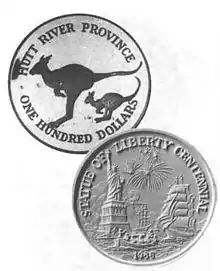
In 1977, $1 coins were struck to commemorate the Silver Jubilee of Elizabeth II. These coins are known as "holey dollars". Coins of the same design were struck again in 1978, without the inscription "Queen's Jubilee".[26]
Later series
Most coins of later series have specific commemorative topics and are usually made of precious metal. The issuance of coins went on until 1995, and resumed in 2000 with the issue of 25 $100 gold coins to commemorate the 30th anniversary of secession. The minting of coins recommenced in 2007 with 1000 $30 coins in .999 fine gold-plated brass to celebrate the 60th wedding anniversary of Leonard and Shirley Casley, a $5 nickel-plated zinc alloy "Lest We Forget" coin, and a set depicting the armorial bearings of Casley and his four sons, a $10 coin for Casley and $5 coins for his sons all minted in nickel-plated, zinc alloy. The "Lest We Forget" coin was reissued in 2009.
In 2010, the Principality issued a $30 gold- and silver-plated brass coin to mark the 40th anniversary of independence. Following the death of his wife in 2013, Casley authorised a special commemorative coin to celebrate her life.[26]
Commemorative coins

In the 1970s, Kevin Gale was hired to manage the marketing of Principality coins and stamps. In 1995 Gale died and it was found that in addition to promoting Principality coins and stamps, he had registered "Hutt River Province" as the name of a Queensland company of which he was sole owner and from which no profits were forwarded to the Principality.
From 1984 to 1989, Johnson Matthey Refining, Rochester, New York, a manufacturer of precious metal products, manufactured limited numbers of commemorative coins for Mel Wacks, who had been appointed exclusive American distributor by Leonard Casley.
In 1989, production was transferred to the Continental Coin Company (in California). From 1989 to 1995, the mint produced various themed commemorative Hutt River Province coins which were sold on the US market. Although the total number of coins minted is unknown, it is known that 10,000 $20 coins were minted in 1991 to mark the 50th anniversary of the attack on Pearl Harbor. Up to 200 different commemorative coins in three denominations each ($5, $10 and $20) are believed to have been minted to commemorate Desert Storm, World War II, The Fathers of Baseball, etc. Prince Leonard authorised all these coins and received samples as well as royalties.
All of these Principality coins are contained in the standard catalogue of Unusual World Coins by Colin Bruce II, edited by Tom Michael and George Cuhaj. A$100 denomination proof commemorative coin issue that contained 1 troy ounce of pure palladium sold for $299 in 1989; the 2012 value of the palladium content was $630.[69][70]
References
Footnotes
- "Constitution" (PDF).
- Casley, Leonard (21 April 1970). "The Fate [sic] Accompli" (PDF). Principality of Hutt River. Retrieved 19 April 2018.
- "Micronation : The Principality of Hutt River | Our Naked Australia".
- Casley v Commissioner of Taxation [2007] HCATrans 590; Casley v Deputy Commissioner of Taxation [2017] WASCA 196, [8].
- Pascual Juanola, Marta (10 January 2020). "Hutt River Principality will close its doors 'until further notice' due to financial hardship". WAtoday. Retrieved 21 February 2020.
- "Official Home Site of the Principality of Hutt River". www.principality-hutt-river.com. Retrieved 22 February 2020.
- "A man's Hutt is his castle", The Age, 24 April 2010.
- Sarah Taillier (1 February 2017). "Prince Leonard of Hutt River Principality abdicates to son Graeme". abc.net.au. – ABC News (Australian Broadcasting Corporation).
- "Australian micronation 'prince' abdicates after 46 years". BBC News. 15 February 2017. Retrieved 20 September 2017.
- Sarah Taillier; Sebastian Neuweiler (11 February 2017). "Hutt River Principality now ruled by Prince Graeme as Prince Leonard stands aside". ABC News. Retrieved 20 September 2017.
- Francesca Mann (13 February 2019). "Hutt River micro-nation founder Prince Leonard dead aged 93". PerthNow. Retrieved 14 February 2019.
- Natasha Harradine (13 February 2019). "Prince Leonard, who founded Hutt River Province after stoush with WA government, dies aged 93". Australian Broadcasting Corporation. Retrieved 13 February 2019.
- "Principality of Hutt River to close its borders!". 27 December 2019.
- Hedley, Kate (3 August 2020). "End of an empire: Hutt River to rejoin Australia after 50 years". WA Today. Retrieved 5 August 2020.
- "Leonard Casley obituary". The Times. 5 March 2019.
- Bicudo de Castro, Vicente; Kober, Ralph (2018). "The Principality of Hutt River: A Territory Marooned in the Western Australian Outback". Shima: The International Journal of Research into Island Cultures. 12 (1): 143–159. doi:10.21463/shima.12.1.13.
- Arnall, Karla (21 April 2015). "Wheatbelt Royals: the future of the Principality of Hutt River". ABC. Retrieved 19 April 2018.
- "Secession Success". The Advertiser. 8 June 2008.
- Hutt River Province ninemsn Getaway 14 October 2004
- Heaton, Andrew (14 May 2013). "Prince of the Outback". Reason magazine. Retrieved 10 February 2014.
- Ryan, John (2006). Micronations. Lonely Planet. ISBN 1-74104-730-7.
- Casley v Commonwealth [1980] WASC 3, Supreme Court (WA, Australia).
- Casley v Knowles [1978] WASC 82, Supreme Court (WA, Australia).
- Richards v Casley [1970] WASC 42, Supreme Court (WA, Australia).
- Publication Printers Pty Ltd v Casley [1984] WASC 320 (21 September 1984), Supreme Court (WA, Australia)
- Rogers, Kerry. "The Coins of HRH Prince Leonard I" (PDF). Australian Coin and Banknote Magazine. Retrieved 10 February 2014.
- Casley v Commissioner of Taxation [2007] HCATrans 590 (4 October 2007).
- Micronation renaming Archived 7 May 2011 at the Wayback Machine
- Pash, Chris (31 January 2017). "Prince Leonard is handing over control of Australia's oldest micronation". businessinsider.com.au.
- Sarah Taillier (6 September 2015). "Hutt River Principality: Monarch of Australia's oldest micro-nation considers passing baton to heir". ABC News. Retrieved 2 February 2017.
- Neuweiler, Sebastian; Menagh, Joanna (16 June 2017). "Australia's oldest micro-nation founders ordered to pay $3m tax bill". ABC News. Retrieved 19 April 2018.
- "Principality of Hutt River to close its borders!". 27 December 2019.
- "Australia's oldest micronation, Hutt River is no more due to Covid-19 - CNN Travel". CNN. 10 August 2020. Retrieved 22 January 2021.
- Stanley, Michelle (3 August 2020). "Hutt River Province to rejoin Commonwealth after 50-year stand-off". ABC News mid-west and wheatbelt. Retrieved 4 August 2020.
- "What is the Hutt River Province?". australia.gov.au. 22 February 1999. Archived from the original on 30 April 2014. Retrieved 30 April 2014.
- "Australian Government Does Not Recognise The Hutt River Province". Australian Embassy, United Arab Emirates. Retrieved 22 May 2009.
- Brendan Hutchens (16 April 2003). "Prince Leonard". George Negus Tonight: people. Australian Broadcasting Commission. Retrieved 28 July 2007.
took the title 'Prince', his wife became Princess Shirley, and together they turned their principality into a tourist destination.
- DFAT FOI documents regarding Hutt River Province (PDF). Archived from the original (PDF) on 13 February 2017.
- Micronation Master: Prince Leonard of Hutt River Bloomberg Businessweek 17 May 2012
- The Royal Showman ABC News 5 May 2010
- "Now Leonard wants a uni.", by Karen Valenti, 17 February 2003, Gold Coast Bulletin, p. 15
- Matt Siegel (17 May 2012). "Micronation Master: Prince Leonard of Hutt River". Bloomberg Businessweek. Retrieved 30 April 2014.
- Deputy Commissioner of Taxation v Casley [2017] WASC 161, Supreme Court (WA, Australia).
- "'Micronation' loses Australian tax battle". BBC News. 16 June 2017.
- Casley v Deputy Commissioner of Taxation [2017] WASCA 1961, Court of Appeal (WA, Australia).
- "Secret document" (PDF).
- "Diplomatic documents regarding the Hutt River Province released under FOI laws" (PDF).
- Rewards for Rebellion: Tiny Nation and Crown for Life The New York Times 1 February 2011
- "Separation – National Museum of Australia". nma.gov.au.
- Shire of Northampton. "Hutt River Province". Municipal Heritage Inventory. Heritage Council of Western Australia. Retrieved 15 February 2014.
- Johanson, Mark. "The people who create their own 'countries'". cnn.com.
- "The Mouse that Roared", ABC News, 18 April 2010
- "Information concerning known fantasy and camouflage passports". Archived from the original on 9 March 2012.
- Mercer, Daniel "Hong Kong gives nod to Hutt River", The West Australian, 28 January 2012, p. 23.
- Wood, Leonie (26 January 2012). "Some like it hutt but others beg to differ". The Age.
- Za'za', Bassam (26 March 2008). "Hutt River 'ambassador' accused of conning people". Gulf News. Retrieved 23 January 2014.
- AAP/AFP (27 March 2008). "Defendant claims to be Hutt ambassador". The Age. Retrieved 23 January 2014.
- Pash, Chris (21 April 2016). "This 46-year-old Australian micronation has finally been recognised by Buckingham Palace". businessinsider.com.au.
- "The unknown country within Australia", Off the Path, 17 June 2011.
- "Offshore Financial And Legal Consultant". The Offshore Yellow Pages. A directory of Tax Havens. Retrieved 9 June 2008.
- Development of Asset Protection Structures "Mondaq Business Briefing" Mondaq Ltd. 29 March 2005 HighBeam Research accessed 14 June 2012
- Office, Australian Taxation. "Aggressive Tax Planning: 'Hutt River Province' and international business companies". ato.gov.au. Archived from the original on 23 May 2016.
- "Principality of Hutt River Constitution, Rev 01" (PDF). Principality of Hutt River. 2010. Archived from the original (PDF) on 25 April 2015.
- "Exhibitions: Eternity – Separation". NMA Homepage. National Museum of Australia. Retrieved 13 May 2007.
- "Hutt River's 'princess' Shirley Casley dies aged 85". theaustralian.com.au. 10 July 2013. Retrieved 10 July 2013.
- Yolanda Zaw (10 July 2013). "Tributes for Hutt River matriarch". The West Australian. Au.news.yahoo.com. Retrieved 30 April 2014.
- "Hutt River principality princess dies peacefully". ABC News (Australian Broadcasting Corporation). 9 July 2013. Retrieved 30 April 2014.
- HRH Princess Shirley Archived 9 July 2012 at the Wayback Machine Principality of Hutt River.com
- Ed Rochette One-man nation strikes again Chicago Sun-Times 19 November 1989 HighBeam Research accessed 14 June 2012
- Palladium prices Live Palladium prices in AUD per ounce.
Sources
- "Mini-states Down Under are sure they can secede" by Nick Squires, The Daily Telegraph, 24 February 2005
- "If at first you don't secede…" by Mark Dapin, The Sydney Morning Herald, 12 February 2005, pp. 47–50
- "Unusual World Coins", by Colin R. Bruce, Krause Publications, 2005, ISBN 0-87349-793-7, p. 240
- This 46-year-old Australian micronation has finally been recognised by Buckingham Palace